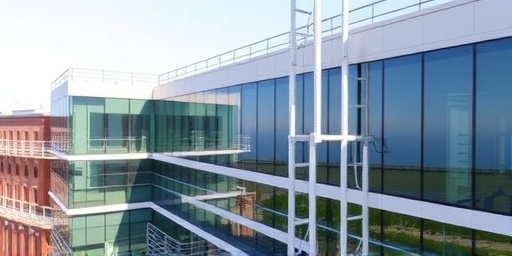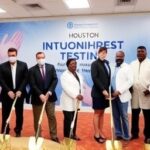In a bold move for public health resilience, Houston officials broke ground on a cutting-edge 13,756-square-foot infectious disease testing lab this week, undeterred by the sudden cancellation of a key federal grant from the CDC. The $22 million project, now fully backed by city funds, promises to bolster the city’s capacity to detect and respond to outbreaks, drawing praise from local leaders amid lingering lessons from the COVID-19 pandemic.
The ceremonial groundbreaking at the Texas Medical Center site on Tuesday featured Mayor John Whitmire wielding a golden shovel alongside health department directors and biomedical experts. ‘Houston will not wait for Washington,’ Whitmire declared to a crowd of over 200 attendees. ‘This lab represents our commitment to protecting our 2.3 million residents from the next invisible threat.’
City Funding Fills Void Left by CDC’s Unexpected Grant Ax
The project’s origins trace back to early 2023, when Houston secured a preliminary $5 million commitment from the Centers for Disease Control and Prevention (CDC) under its Public Health Emergency Preparedness program. Designed to enhance biosecurity in urban centers, the grant was poised to fund specialized equipment like PCR machines and biosafety level 3 (BSL-3) containment suites. However, in a shocking twist last month, the CDC rescinded the award citing ‘budget reallocations due to shifting national priorities.’
Houston Health Department Director Dr. Ericka Lugo explained the fallout during the event: ‘We were blindsided. The CDC’s decision came via email with little explanation, forcing us to pivot quickly.’ City council quickly approved reallocating $22 million from its capital improvement budget, including surplus pandemic relief funds. This self-reliance mirrors a growing trend among major U.S. cities, where federal funding volatility has prompted local investments in infrastructure.
Financial breakdowns reveal the lab’s scope: $12 million for construction, $6 million for high-tech fittings, and $4 million for staffing and operations in the first year. Economists estimate the facility will create 75 direct jobs, plus indirect employment in supply chains, injecting over $10 million annually into the local economy.
Lab Features Engineered for Rapid Pathogen Detection in Houston
Spanning 13,756 square feet across two stories, the new Houston infectious disease testing lab will incorporate state-of-the-art technology tailored for urban threats. Key highlights include:
- BSL-3 Containment Zones: Four sealed labs capable of handling airborne pathogens like tuberculosis and novel coronaviruses, with negative-pressure airflow systems exceeding federal standards.
- High-Throughput Sequencing: Next-generation sequencers to identify variants in under 24 hours, a vast improvement over regional capacities strained during COVID peaks.
- Automated Testing Pipelines: Robotics for processing up to 10,000 samples daily, integrating AI-driven analytics for predictive outbreak modeling.
- Training and Research Hubs: Classrooms and wet labs for 50 trainees annually, partnering with Baylor College of Medicine and UTHealth.
Architects from Gensler, the firm behind the project, emphasized sustainability: solar panels will power 30% of operations, and water recycling systems align with Houston’s flood-prone environment. ‘This isn’t just a building; it’s a fortress for public health,’ said lead designer Maria Gonzalez.
The facility’s location in the world’s largest medical complex—home to 60 institutions and 10 million patient visits yearly—positions it as a national asset. During the pandemic, Houston labs processed over 5 million tests, but bottlenecks revealed the need for dedicated infectious disease infrastructure.
Reactions Pour In as CDC Cut Sparks Debate on Federal Support
The CDC’s grant revocation has ignited bipartisan criticism. Texas Governor Greg Abbott tweeted, ‘Federal bureaucracy fails again. Kudos to Houston for stepping up.’ U.S. Rep. Sylvia Garcia (D-TX), whose district includes parts of the city, vowed to probe the decision: ‘This lab is critical for our vulnerable populations. I’ll push for accountability in Congress.’
CDC spokesperson Dr. Rachel Levine defended the move in a statement: ‘Priorities shifted to rural and underserved areas post-COVID. We remain committed to partnering with Houston.’ Critics, however, point to a 15% cut in CDC’s state and local funding since 2022, amid inflation and rising global threats like mpox and bird flu.
Local epidemiologists weighed in heavily. Dr. Peter Hotez, dean at Baylor’s National School of Tropical Medicine, attended the groundbreaking and praised the initiative: ‘Houston’s at the epicenter of vector-borne diseases—West Nile, Zika. This lab will save lives by closing diagnostic gaps.’
Public sentiment, gauged by a snap poll from the Houston Chronicle, shows 78% approval, with residents citing recent dengue fever spikes in Harris County (over 100 cases in 2024) as urgency drivers.
Houston’s History of Infectious Disease Challenges Fuels Urgency
Houston’s humid climate and international port status make it a hotspot for infectious diseases. Historical outbreaks underscore the lab’s necessity: Hurricane Harvey in 2017 unleashed Vibrio vulnificus in floodwaters, sickening dozens. The 2020 COVID surge overwhelmed testing sites, with wait times exceeding a week.
Statistics paint a stark picture:
- Harris County reports 20% higher flu hospitalization rates than national averages.
- Annually, 500+ tuberculosis cases emerge, mostly among immigrants.
- Mosquito-borne threats like West Nile have claimed 15 lives since 2002.
The new testing lab addresses these by enabling point-of-care diagnostics and genomic surveillance, integrating with the CDC’s national network despite the funding hiccup. Partnerships with Harris County Public Health and private labs like Quest Diagnostics will amplify reach.
Funding the project locally also sidesteps federal red tape. ‘No more waiting for approvals that never come,’ said Councilmember Edward Pollard, who spearheaded the budget shift. This approach has precedents: New York City’s $100 million pandemic lab in 2021 and Los Angeles’ biosecurity upgrades.
Timeline and Long-Term Boost for Houston Public Health
Construction kicks off immediately, with Phase 1 (core labs) slated for completion by Q2 2026, followed by full operations in early 2027. Milestones include foundation work by year-end and equipment installation next summer. The city anticipates certifications from the CDC and WHO, ensuring interoperability.
Long-term, the lab will transform Houston’s response ecosystem. Projections indicate a 40% faster outbreak detection, potentially averting $50 million in annual healthcare costs. It will train 200 professionals over five years, positioning Houston as a Gulf Coast hub for tropical medicine research.
As global travel rebounds—Houston’s airport handles 50 million passengers yearly—the facility hedges against emerging threats like avian influenza variants detected in Texas cattle. Health Commissioner Lugo envisions expansion: ‘This is scalable. With success, we’ll advocate for satellite labs citywide.’
Industry watchers from BioSpace predict ripple effects, attracting biotech firms and federal grants anew. ‘Houston’s proving local innovation trumps dependency,’ said analyst Dr. Nina Patel. For residents, it’s tangible security in an unpredictable world, ensuring the Bayou City stays ahead of the curve.








